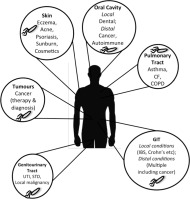Journal of Controlled Release ( IF 10.8 ) Pub Date : 2018-02-22 , DOI: 10.1016/j.jconrel.2018.02.023 Yensi Flores Bueso , Panos Lehouritis , Mark Tangney

|
The ability to modify existing microbiota at different sites presents enormous potential for local or indirect management of various diseases. Because bacteria can be maintained for lengthy periods in various regions of the body, they represent a platform with enormous potential for targeted production of biomolecules, which offer tremendous promise for therapeutic and diagnostic approaches for various diseases. While biological medicines are currently limited in the clinic to patient administration of exogenously produced biomolecules from engineered cells, in situ production of biomolecules presents enormous scope in medicine and beyond.
The slow pace and high expense of traditional research approaches has particularly hampered the development of biological medicines. It may be argued that bacterial-based medicine has been “waiting” for the advent of enabling technology. We propose that this technology is Synthetic Biology, and that the wait is over. Synthetic Biology facilitates a systematic approach to programming living entities and/or their products, using an approach to Research and Development (R&D) that facilitates rapid, cheap, accessible, yet sophisticated product development. Full engagement with the Synthetic Biology approach to R&D can unlock the potential for bacteria as medicines for cancer and other indications.
In this review, we describe how by employing Synthetic Biology, designer bugs can be used as drugs, drug-production factories or diagnostic devices, using oncology as an exemplar for the concept of in situ biomolecule production in medicine.
中文翻译:

细菌原位生产生物分子;一种合成生物学医学方法
修改不同地点现有微生物群的能力为各种疾病的局部或间接管理提供了巨大的潜力。因为细菌可以在人体的各个区域中长期保持,所以它们代表了一个有针对性地生产生物分子的巨大潜力的平台,为各种疾病的治疗和诊断方法提供了广阔的前景。尽管目前生物医学在临床上仅限于患者对工程化细胞产生的外源生物分子进行管理,但生物分子的原位生产在医学及其他领域具有广阔的应用前景。
传统研究方法的缓慢发展和高额费用尤其阻碍了生物医学的发展。可能有人争辩说,基于细菌的药物一直在“等待”实现技术的出现。我们认为这项技术是“合成生物学”,并且等待已经结束。合成生物学使用一种研究和开发(R&D)方法来促进对生活实体和/或其产品进行编程的系统化方法,该方法可以促进快速,廉价,可访问但复杂的产品开发。充分利用合成生物学方法进行研发可以释放细菌作为癌症和其他适应症药物的潜力。
在这篇综述中,我们描述了如何通过利用合成生物学将设计人员的臭虫用作药物,药物生产工厂或诊断设备,以及如何将肿瘤学用作医学中原位生物分子生产概念的典范。



























 京公网安备 11010802027423号
京公网安备 11010802027423号